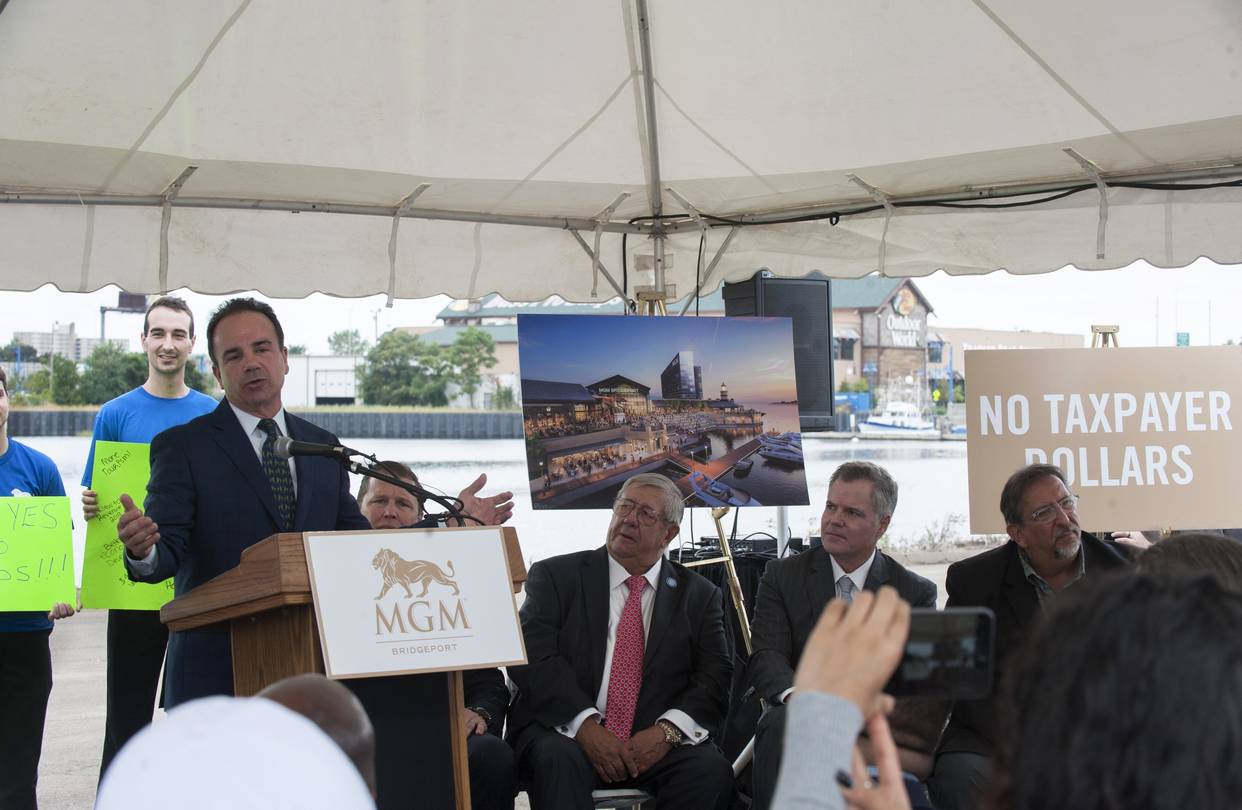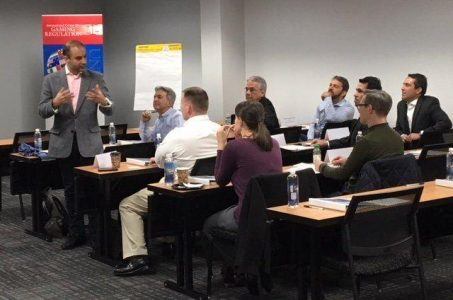MGM Resorts New York Casino Acquisition Not a Factor in Ongoing Bridgeport, Connecticut Push
Posted on: May 31, 2018, 11:30h.
Last updated on: May 31, 2018, 11:36h.
MGM Resorts says its $850 million purchase of Empire City Casino in Yonkers, New York will not impact its intention to build an integrated resort in Bridgeport, Connecticut as well.

MGM has been spending millions of dollars in the Connecticut capital of Hartford in hopes of swaying lawmakers into supporting a competitive bidding process to expand gaming. Governor Dannel Malloy (D) signed a bill in 2017 that authorized the state’s two Native American groups to jointly construct a $300 million satellite casino in East Windsor.
The Mashantucket Pequot and Mohegan Sun tribes, working together as an entity known as MMCT, are looking to prevent gaming dollars from flowing across the Connecticut-Massachusetts border to the nearby MGM Springfield, a $960 million integrated casino resort that’s set to open this August.
MGM argues the state didn’t get the best deal in deciding to expand gambling to non-sovereign land, and subsequently proposed building a $675 million waterfront resort in Bridgeport.
A bill that would have revoked the MMCT East Windsor license in favor of accepting bids for a third casino from both tribes and commercial operators failed earlier this month.
Lucky Seven Not Enough
When the Empire City Casino deal closes in 2019, MGM Resorts will expand its domestic casino portfolio to seven states. The company has been concentrated on the northeast in recent years, as it acquired full ownership of the Borgata in Atlantic City, and spent $1.4 billion building MGM National Harbor near Washington, DC.
Adding Massachusetts and New York continues the casino operator’s expansion focus, but doesn’t negate MGM’s Bridgeport aims.
“While we remain hopeful that Connecticut will build on this year’s legislative progress and ultimately authorize a competitive process for a commercial casino license, the state’s delay will not deter us from executing our company’s comprehensive growth strategy,” MGM said in a statement.
Rep. Christopher Rosario (D-Bridgeport), one of the authors of the legislation that sought to rethink how the state should expand gambling, said he saw this coming. The lawmaker tweeted an article six months ago that discussed Empire City’s owners looking for “strategic partnerships.”
“I saw this coming a mile away. If the Connecticut General Assembly doesn’t do something about gaming in Bridgeport this is what’s going to happen,” Rosario declared to the Connecticut Post.
Connecticut Complexities
Critics to MGM Resorts’ Bridgeport plan, which includes paying a $50 million licensing fee to the state as opposed to the $2 million MMCT paid, say it’s all just a big bluff to stall progress in East Windsor.
Tribal spokesman Andrew Doba opined in January, “MGM has shown, month after month, year after year, that they are willing to spend ungodly amounts of money to prevent Connecticut from taking the logical and necessary steps to protecting jobs and revenue.”
Complicating the matter is that Connecticut legalizing commercial casinos would violate the state’s gaming compacts with the Mashantucket and Mohegan Sun tribes.
That means the 25 percent of gross gaming slot revenue the Foxwoods and Mohegan Sun casinos share with the government — which totaled $269 million last year — would be in jeopardy.
Related News Articles
Most Popular
FTC: Casino Resort Fees Must Be Included in Upfront Hotel Rates
Genovese Capo Sentenced for Illegal Gambling on Long Island
NBA Referees Expose Sports Betting Abuse Following Steve Kerr Meltdown
UPDATE: Former Resorts World & MGM Grand Prez Loses Gaming License
Most Commented
-
UPDATE: Whiskey Pete’s Casino Near Las Vegas Closes
— December 20, 2024 — 30 Comments -
Caesars Virginia in Danville Now Accepting Hotel Room Reservations
— November 27, 2024 — 9 Comments -
UPDATE: Former Resorts World & MGM Grand Prez Loses Gaming License
— December 19, 2024 — 8 Comments -
FTC: Casino Resort Fees Must Be Included in Upfront Hotel Rates
— December 17, 2024 — 7 Comments
















Last Comment ( 1 )
“BUST – How I gambled and lost a fortune.” an autobiography of a “whale” gambler, who lost very big. as written by Adam Resnick, with Todd Gold. book review by M.W. Lechner “By 2:15, I (Resnick speaking) was up another $5,000,000. I had chips in front of me totaling $8.6 million. The bank had asked me for $3 million. I had that and more, plenty more – and that was after tipping the dealers roughly three hundred fifty thousand dollars over the course of the day; yes, three hundred fifty thousand dollars. I stared at the chips truly amazed. I’d never seen chips cover that much landscape on a table.” “Fuck it”, I (Resnick) said. “Just fuck it. Fuck all of you.” I (Resnick still speaking) turned to the dealer. “Just deal. I’m going to play.” ………. then…….. “My $2.1 million was down to forty thousand dollars.” ……….then………. “…I didn’t have a dollar left on me.” Then the bank that the money Resnick was using to gamble had been stolen from … the bank collapsed under the weight of Resnick’s fraud (along with the culpability of the inside bank people and associates who assisted him with a rather substantial check-kiting conspiracy), and Adam Resnick was sentenced to 3 and ½ years in federal prison for gambling with money that he obtained from the bank via the check-kiting scheme, assisted by inside bank people and an accountant, whose goal was to get ever larger sums of money from the bank, to gamble with at casino’s, via bookies, etc. He literally broke the bank. Some of the enablers of the bank fraud were also held to account by the federal prosecutors. The bank fraud they utilized was a variant of check kiting. It is a sad story, to state the obvious; however it does present a valid and credible documentary of how the apparatus of the gambling industry, both the legal casino’s in places like Las Vegas, as well as illegal bookies – the book presents a valid and credible documentary of a) how they work, and b) how they “cultivate” people who are problem gamblers to grow their problem to benefit the interests of the gambling industry, both the legal and illegal aspects of it. Adam Resnick was not born rich, with money to burn. His father was a reasonably prosperous businessman, who himself had a gambling problem, but one that did not grow to the proportions that his son’s problem would. From the beginning of the story, through its end – Resnick presents the idea that his gambling problem had roots in his core personality which began to display itself in his childhood, which the reader may or may not agree with. However, it is a strong theme that runs through the story – i.e. that it all started essentially before he had any control, that it was in a way inevitable due to his innate personality. And that view is echoed later on by psychologists and therapists who cite Resnick’s success in their program(s), and urge the sentencing judge to go easy on him, which the judge did. That said, Resnick’s remorse seems not completely disingenuous; he does express sincere sorrow and regret to his family. Essentially, Resnick posits that he was mentally born with the problem, which again the reader may or may not agree with. He cites an incident when he was a youngster and got so fixated on chasing leaves falling from a tree, that he missed the school bus – positing this incident shows he was born not being able to control himself and was destined to the life of a pathological gambler. Maybe it’s true, that he was born that way. Maybe not. A lot of kids like playing around with leaves, and their adult lives do not then revolve around betting. It’s hard to know, is there an element of the pathology that Resnick was born with, or is it simply choices he made, as they turned out to be bad choices - and that is a question the reader is left to ponder him or herself. Should gambling be excused due to a theory of “born pathology” ? It is not a tremendously credible or compelling theory. Resnick also lays some blame on the example his father set, being involved with gambling, and the reader is drawn to sympathize with that to some extent – yet the blaming of fate, and of others, is a theme that does run through his story. However, at the end, he says he does not do that anymore. In other words, at the end, after destroying his family’s financial security, his career, and a local bank – he speaks sincerely to the effect he intends to mend his ways. And – the reader is drawn to hope that he has, and that he will. However, he got off very, very light – as did the banker and accountant. Millions of dollars were stolen from the small bank and given over to the casino. And a certain nausea comes to the reader as the story of the bank fraud unfolds within the Resnick autobiography. Small bankers got seriously, seriously ripped off – and the casino’s apparently kept the money. As best the reader can tell, no effort was made to hold the casino’s to account, and the prosecutors should have made that effort. Oddly, the book speaks not a word regarding Resnick’s time in prison, and that would have been a good thing to include at least some of that. At the end, Resnick, still speaks well of the casino industry, its leaders, the people who do its dirty work, etc. and that is both sad and troubling. It is as though he is saying, he just had bad luck – that casino’s and bookie’s are worthy of our respect. Resnick is still complimenting and voicing the same chumminess with them, that caused them to eagerly take all of the ill-gotten money Resnick used over the years, to gamble and destroy his family, and his career. And he is saying this literally as he is on the verge of beginning his prison sentence. That is sad, in a way, and troubling. The reader almost wants to write in the margins “come on, don’t you know by now, these people are not your friends, that casino’s are bad places” ? One of the predictable but nonetheless very troubling “windows” into the world of gambling that “BUST” presents, has to do with the mammoth debts incurred by gamblers, and the loan shark thugs who exact payment of those debts. In the context of Bridgeport – one has to ask, is this wanted for the City of Bridgeport and its environs ? The loan shark thugs who come in tow with the world of gambling, in “BUST” are a vulgar and repugnant group, ugly and dangerous people. In “BUST” the reader sees them, at various points in the story, pressing knives against the throats of various gamblers who have “fallen behind”, appearing with shotguns and firearms even in public places like airports, locking people in the trunks of cars, punching debtor/gamblers in the face, etc. One of the saddest parts of the book is when Resnick has, of course due to circumstances “beyond his control” assumed the role of lender/bookie to another problem gambler, who will not or can not pay – and Resnick dispatches a Mafia thug-type hoodlum to pressure the debor/gambler for payment, and the thug dutifully and violently roughs up the designated debtor/gambler, smashing him in the face. Is this also, to-be-excused, due to a “born pathology” ? No. One highlight of the book is Resnick’s interactions and relationship with his wife – who seemed to stand by him through thick and thin. The reader can not help but feel sorry for her, for the harm and financial devastation inflicted on her by Resnick and the gambling industry, and its various hangers-on such as the loan sharks and their thumb-buster, kneecapping debt collectors. Resnick too, is very blah about the culpability of the casino’s, loan sharks, and bookies in the damage done to his family. It is almost as though he presents it as “no one’s fault”, but of course the tragedy did not take place in a vacuum. There is no escaping the questions as to why did it happen, how did it happen, and where else and who else is at risk ? In total, the book presents the story of Adam Resnick’s gambling as a neutral documentary. In that sense, the book is a sharp lens that does capture the narrative of events. However, if the reader is looking for remorse, or signs of a lesson learned – there is not much in that department. It is like an old black and white crime movie, where the criminals never get caught and the crime never got solved. Yet seeing the film, does advantage the reader in the fight against gambling in the community because it does chronicle the story quite effectively. The parts that are missing are the remorse, the understanding of what was lost in the process, the sense that the chronicled conduct was morally very wrong to engage in, and the understanding that gambling is a very bad thing. In that sense, the book projects a rather hard edge, in effect saying “I had to learn the hard way, you can learn the hard way too.” Showing pictures of crime is not enough, the criminal behavior and infrastructure has to be rooted out, and the crimes have to be solved and prevented, not just looked at with a blank stare. The book is a sharp lens on the events, and for that reason, it is definitely worth reading. The book rather accurately shows a troubled sub-set world, that of gambling, loan sharks, and casino’s, that Bridgeport should not become.